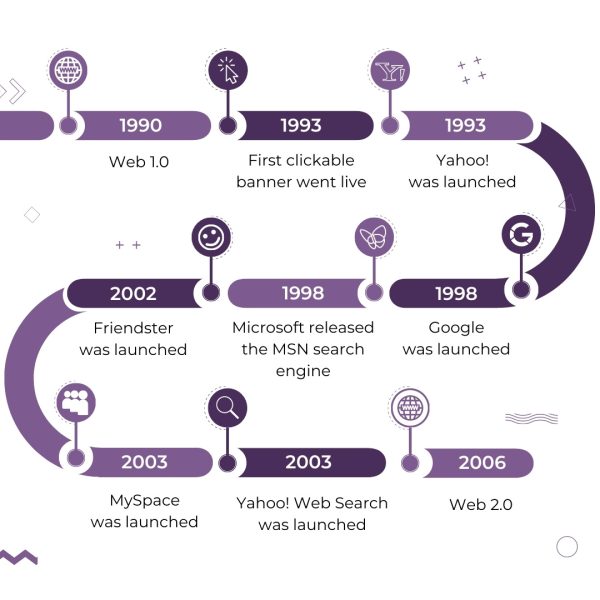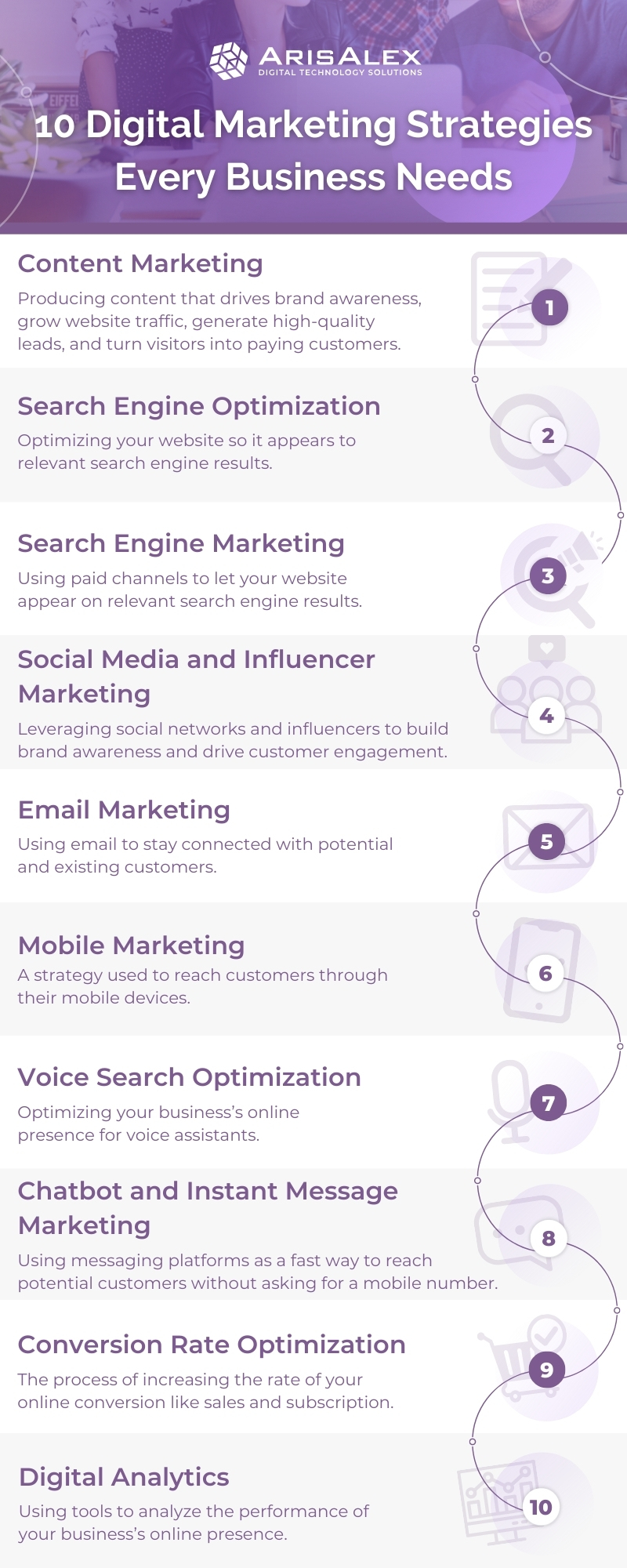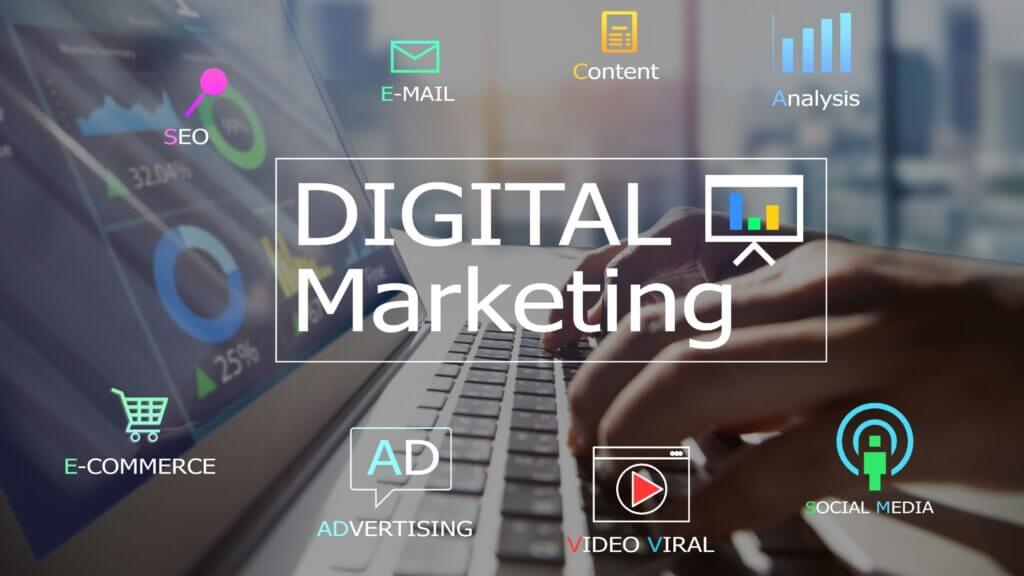Marketing is all about connecting with your customers in the right place at the right time. Nowadays, people are always online. In fact, the 2021 Pew Research revealed that about 85% of US adults go online daily.
Enter: Digital marketing.
What is Digital Marketing?
Also called online marketing, digital marketing is an umbrella term that refers to all promotional efforts that a business does on the world wide web. This includes having a website and ensuring that it ranks on Google or has active Facebook and Instagram pages.
Traditional vs. Digital Marketing
As mentioned earlier, digital marketing refers to all promotional efforts that you do for your business online. On the other hand, traditional marketing is all about using traditional media like billboards, TV and radio ads, and printed media.
Simply put, the main difference between the two is the medium through which your customers encounter your marketing message.
Digital Marketing Through the Years

The term “digital marketing” was first used in the 1990s following the development of Web 1.0. During this time, people can search for the information they need on the Web, albeit they cannot share it.
The first clickable banner went live in 1993. A year later, AT&T purchased a banner ad on HotWired.com. According to a post on The Atlantic, four out of 10 people who saw the ad clicked it. This marked the beginning of digital marketing. It was also during this year that Yahoo! was launched.
Google was launched in 1998, and Microsoft released the MSN search engine. Meanwhile, Yahoo! brought the Yahoo! web search. Two years later, the Internet bubble burst, and 2006 was the year when digital marketing saw a steep surge.
After this, Web 2.0 happened, allowing Internet users to interact with one another and with businesses. Soon, social networks like MySpace and Friendster emerged. Within the next decade, companies realized how helpful social networks are – like Facebook and Instagram – in helping them connect with their customers.
Hence, the boom of the digital marketing industry.
6 Benefits of Digital Marketing to Businesses
Here’s the thing: Consumers, these days, go online to learn about brands and their products or services. This explains why we recommend business owners to have a website. Otherwise, you should have a social media presence or a digital ad strategy.
According to a LOCALiQ, 63% of businesses have increased their digital marketing budget this past year. That’s because it works, and these statistics are proof of it:
- PPC returns a 200% ROI rate for every dollar spent
- Businesses that blog get 55% more traffic
- SEO leads have a nearly 15% close rate
- 64% of consumers who watch a social media video end up making a purchase
- The average email open rate across all industries is 80%
If you are still unconvinced on why you should take the digital marketing route, here are the six reasons your business needs it:
Even the Playing Field
Whether you run a startup, a small business owner, or have a B2B company, digital marketing helps even the playing field.
A B2B company may have a significant marketing budget, but it can only do so much if its website is not optimized for conversion. On the other hand, a small business may have a limited marketing budget. But because their website is search engine optimized, they rank well for the right keywords. As a result, they can continuously generate leads and turn them into paying customers.
Identify and Target Specific Customers
When you place an ad on TV, on a billboard, or magazine, you have no control over who sees your ad. Sure, you can measure specific parameters like a magazine readership. But how many of your customers bought your products because they saw your magazine ad?
Meanwhile, digital marketing allows you to identify your target customers. You can do this through keyword research, understanding which queries they use when searching for brands like yours. From there, you can craft your entire online marketing plan to ensure that you will appear in search results.
Engage Your Customers in Every Stage
Another remarkable thing about online marketing is that you can use different tactics for every stage of the marketing funnel.
A blog post can work well for attracting customers who are identifying their needs and considering whether your products can meet those. Meanwhile, email marketing can make a cold lead aware of your brand. You can also use it to make your existing customers loyal to your brand and keep buying your products.
Improve Quality of Leads and Conversion
Let’s face it: Not everyone can be your customer. Thus, looking for people who are likely to buy your products would be best. It is a good thing that this is something digital marketing can do for you.
First, you can measure the effectiveness of the tactics you are using. This allows you to refine your methods to ensure you target the right customers in your every campaign. The higher the affinity of a lead to your target customer, the more likely they will convert.
Simply put, digital marketing allows you to connect with the right people so you can consistently generate sales.
Choose Where to Spend Your Marketing Money
What’s great about digital marketing is that they are measurable. You can monitor which of your marketing channels are bringing in your desired results and choose whether to continue or not.
For instance, a pay-per-click campaign allows you to drive sales. It only makes sense that you allot a budget for more PPC campaigns. On the other hand, your social media channels are great for nurturing potential customers and fostering brand loyalty. As such, you would not want to let off these channels.
Adapt and Change as Needed
In relation to the previous point, digital marketing enables you to adapt and change your promotional tactics as needed.
If your PPC campaign brings in traffic, leads, or sales, you can pause it. Perhaps you can tweak it and re-run it to see if it will do well, or you can stop the campaign altogether.
You cannot say the same with placing a billboard ad. That’s because you must pay for the ad placement, whether it is working well for your business or not.
10 Digital Marketing Strategies That Every Business Needs
What’s great about having a digital marketing plan is that you have several options. As such, you can get creative on leveraging it and executing strategies according to your marketing goals and budget.
That said, here are ten digital marketing strategies that you will need for your business.

Content Marketing
From the term itself, content marketing refers to the production and promotion of your content. You want to produce content to drive brand awareness, grow your traffic, generate high-quality leads, and turn site visitors into paying customers.
However, remember that your content is not limited to whatever is on your web page and blog. The social media updates, graphics, email, and YouTube videos that you make are also content. And they can help you achieve your digital marketing goals.
Search Engine Optimization
SEO is the process of optimizing your website so it can rank for your target keywords. This also includes striving to make your site appear on the first page of search engine results. That way, you can increase the amount of organic or unpaid traffic you can drive to your website.
Optimizing your website for search engines comes with three approaches:
- On-page SEO. This approach lets you focus on the content that exists on your website. This includes incorporating your target keywords in your web content and having an internal linking system.
- Off-page SEO. If on-page SEO focuses on the content on your website, off-page SEO refers to any optimization activities outside of your website. An excellent example of this is generating backlinks from other relevant websites.
- Technical SEO. This SEO approach focuses on your website backend. We are talking about structured data, image compression, and tactics that can help your website load faster.
Search Engine Marketing
While SEO generates organic traffic, leads, and conversion, SEM is the paid counterpart. An excellent example of SEM is pay-per-click marketing.
With PPC, you are essentially paying a search engine to make your website appear on the top result. However, this will only happen if your search ad meets the following criteria:
- Your ad is optimized for your target keyword
- Your landing page is relevant to your ad
- Your ad has a high quality score
Other examples of search engine marketing are native advertising and retargeting ads.
Social Media and Influencer Marketing
Social media marketing refers to using social media to promote your business. Like content marketing, you want your business to have a social media presence to drive brand awareness and website traffic and connect with your potential and existing customers.
Social media can also be an excellent tool to monitor people’s sentiments about your business and products. In addition, you can collaborate with people who have hundreds of social media following to promote your brand. This is called influencer marketing.
Email Marketing
Emails are commonly used within organizations for internal communication. But what if we tell you that you can also use it to promote your business?
Email marketing is ideal for staying connected with potential customers or encouraging them to buy your products and return for more. Some examples of emails that you can send for marketing purposes are:
- Newsletters
- Promos or loyalty programs
- Event invites
- Exclusive discounts
Mobile Marketing
Mobile marketing is a strategy to reach your customers through their mobile devices. As such, components of mobile marketing include:
- Mobile websites
- Mobile apps
- SMS and MMS
Nowadays, businesses must consider mobile marketing. That’s because over 50% of website traffic and 40% of email opens happen on mobile. These stats can convince you that your website and email content should be mobile-friendly.
Voice Search Optimization
Voice Search Optimization, or Voice SEO, is optimizing your business’s online presence for voice assistants like Siri, OK Google, and Alexa. This means that your online content should also be available for verbal searches.
Is it vital to optimize your website for voice search? The following Voice SEO statistics mean you should:
- 58% of consumers use voice search to find information about a local business
- 27% of Google users use voice search on mobile
- 75% of voice search results rank in the top three positions for a relevant search query on desktop
Chatbot and Instant Message Marketing
Using messaging platforms like Messenger and WhatsApp is a fast way to reach your potential customers. The best part? They do not even have to give their mobile number!
Nevertheless, subscribing to your business through chatbots and instant messaging platforms allows you to inform customers about new products, discounts and promos, exclusive events, and more.
Conversion Rate Optimization
CRO is the process of increasing the rate of your online conversion.
“Conversion” can mean different things for businesses. For a startup, that could be the number of people who downloaded their app through their website. For a small business, a conversion could mean sales, while it could mean lead for a B2B company.
Digital Analytics
Digital analytics is the process of analyzing the performance of your business’s online presence. This includes knowing the number of people who visited your website, how many people engaged with a particular social media post, and more. Digital analytics is integral in any marketing strategy as it can help you measure whether a campaign or a specific channel is working.
Start Exploring What Digital Marketing can Do for Your Business
Digital marketing allows your business to expand its market reach compared to traditional marketing. Moreover, it gives you the tools to target the right market segment or measure whether your campaign is bringing in desired results. This also explains why online marketing is a cost-effective way of promoting your business.
So if you haven’t tried any of the digital marketing strategies listed above, now is the time to start exploring what you can do for your business.





